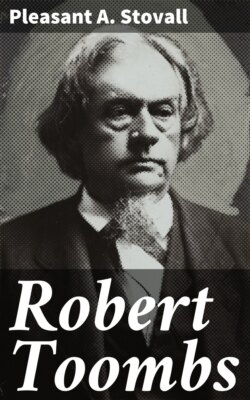Читать книгу Robert Toombs - Pleasant A. Stovall - Страница 10
На сайте Литреса книга снята с продажи.
ОглавлениеThis locomotive started beautifully and majestically from the depository and, following the impetus given, flew with surprising velocity on the road which hereafter is to be her natural element.
The General Assembly decided that these rail lines should have an outlet to the West. This great road was finally built and operated from Atlanta to Chattanooga, and is still owned by the State, a monument to the sagacity and persistency of Toombs and his associates in 1840. The great possibilities of these iron highways opened the eyes of the statesmen of that day, Mr. Calhoun seemed to drop for a time his philosophical studies of States and slavery and to dream of railroads and commercial greatness. He proposed the connection of the Atlantic Ocean with the Mississippi River and the great West, through Cumberland Gap—a brilliant and feasible scheme. Governor Gilmer of Georgia declared in his message that these projected roads "would add new bonds to the Union." But King Cotton, with his millions in serfdom, issued his imperial decrees, and not even this great railroad development could keep down the tremendous tragedy of the century.
One of the measures to which Mr. Toombs devoted great attention during his legislative term was the establishment of a State Supreme Court. This bill was several times defeated, but finally in 1843 passed the house by a vote of 88 to 86. It was the scene of many of his forensic triumphs. He also introduced, during the sessions of 1842 and 1843, bills to abolish suretyship in Georgia. This system had been severely abused. In the flush times men indorsed without stint, and then during the panic of 1837 "reaped the whirlwind." Fortunes were swept away, individual credit ruined, and families brought to beggary by this reckless system of surety. What a man seldom refused to do for another, Mr. Toombs strove to reach by law. But the system had become too firmly intrenched in the financial habits of the people. His bill, which he distinctly stated was to apply alone to future and not past contracts, only commanded a small minority of votes. It was looked upon as an abridgment of personal liberty. Mr. Toombs exerted all of his efforts in behalf of this bill, and it became quite an issue in Georgia. It is not a little strange that when Robert Toombs was dead, it was found that his own estate was involved by a series of indorsements which he had given in Atlanta to the Kimball House Company. Had he maintained the activity of his younger days, he would probably have turned this deal into a profitable investment. The complication was finally arranged, but his large property came near being swept away under the same system of surety he had striven to abolish.
